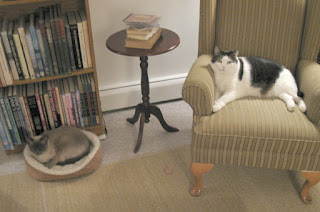The names people give to their pets are often interesting. My cats’ names are mostly rather ordinary, though there is a reason for that. The only cat of all those whom I adopted and also named was Tungsten.
Tungsten is my favourite element. If I’d had a dog, I could have named him Wolfram, which is another name for tungsten. I had long thought that if I had a pet, Tungsten would be a good name for either a male or a female. So, when I adopted my first cat, I re-named her Tungsten. She had been called Presley. Long afterward, even after her death, I realised the fitting significance of the name I had given her. As I have written before, she was small and thin, and brought light and warmth to my life, but for only a relatively short time. Tungsten is the element that comprises the glowing wire in incandescent light bulbs.

The other cats in my life were named by rescue-groups from whom they came. All those I have adopted but Josie came to me as foster-cats. Even my Chubs was a trial-adoption, to see how well she and Tungsten got along. As it turned out, they didn’t; I decided to keep her anyway. I suppose I could have changed her name then - there was, in fact, another Josie in the Lethbridge PAW Society awaiting adoption; she was black, mine was white - but as mine had been with me for several months already, I retained her name. I figured that, as she was used to me calling her ‘Josie’, switching to something else would have confused her too much. Coming to a novel situation and having strangers call you a new name is one thing. Having someone who has always called you ‘Josie’ suddenly start calling you ‘Fillibuster’ - or whatever was chosen - would have been puzzling.
The Great White became Josefina in official correspondence: Josefina von Chubs.
Renn and Tucker were also named by the PAW Society. The names chosen by rescue-groups may seem arbitrary but one must realise that they have many animals to name, and these names cannot make people wary. I’ve seen dogs and cats for adoption who are called ‘Jaws’ or ‘Pounder’, ‘Mischief’ and ‘Trouble’. Inoffensive names convey an inoffensive character - there’s plenty of time to discover the real nature of your new family member later.
Renn initially had just one ’n’ in his name. I don’t know from where he acquired the second. It is more a syllable than a name, so I decided that his name was short for Renfrew - Renfrew Foster, which is what he had once been. As my big boy came to me as a foster-cat, I could not change his name; by the time I had adopted him, he had been with me too long to inflict such confusion on him - the same situation as with Josie.
‘Tucker’ is a common name for cats, I’ve found - as common as one name can be, at least. Another member of the PAW Society had a cat named Tucker, and I have come across several others, as well as a dog with the same name. Again, I felt I could not alter his name once I adopted him. He had been ‘Tucker’ for five years with one family, and so he remained with me: Tucker R. Poly.
I was a part of Cammie’s rescue. I argued for ‘Beulah’, the name applied to Jerusalem after the Israelites returned from their Captivity. I think she would have made a good Beulah. However, Cammie she became, and from the first, she seemed to be a princess, disdaining the more plebeian care given to her roommates - also disdained - and demanding greater service. Her attitude has become much warmer toward me, but the demands are still there. So, while she remains ‘Cammie’ for everyday use, her official designation is Princess Cammerouska Albigensia of Siam.
Others have passed through my life, including my foster-cat Kola, whom I named, partially: he was originally Lola. His people thought he was a girl and, though still a kitten when they discovered their mistake, they did not re-name him. I thought Kola (spelled like the Russian peninsula, rather than the beverage) would suit him better.
I named Faber, a found-cat who was returned to the people who had lost him, and regained his name of Frodo.
Then there was Bear-Bear, notable for his gentle nature, his long, lean frame and his unusual name. He came from a different rescue-group than the one to which I belong; his name did not suit either his shape or his character, but it is engraved on the wooden casket that holds his ashes.
From Wixie to Noah, the names come and go. The cats arrive; some stay, some leave. Some leave after they stay longer than was intended. But each has a name, a name that becomes his own, a name that defines him, at least to me. Names are important; they help us remember and, if there is something after this life, they will help us call once more to those we have missed.



































